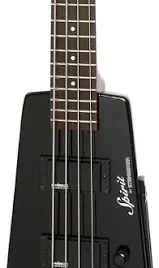Bass Bridge Types: Exploring Sound Options
Ever wonder about that chunk of metal holding your strings in place and how it affects your bass’s sound and playability? The bass bridge may be more important than you might think. Whether you’re a groovy slap bass player or a fingerstyle funk master, the type of bridge on your bass can significantly impact your sound. So, let’s check out the world of bass bridges and find out which type might just elevate your bass playing.
The Role of the Bass Bridge
How Bass Bridge Types Affect Tone
The bridge isn’t just there to look pretty; it’s crucial for transferring the vibration of your strings to the body of your bass. This transfer is what gives your bass its tone. A solid bridge means a solid tone. They anchor a great deal of tension from the strings.
Impact on Sustain and Stability
Ever noticed how some basses just sing while others fall flat? A lot of that has to do with the bridge. A well-designed bridge can enhance your sustain, making your notes hold out longer and more clearly. Plus, it keeps your strings stable and in tune, no matter how hard you rock out.
Bass Bridge Types
Fixed Bridges
- Vintage-Style Bridges: These beauties bring that classic vibe and look to your bass. They’re simple but effective, though sometimes they lack the finer adjustments of modern bridges.
- High-Mass Bridges: Looking for sustain for days? A high-mass bridge might be your answer. These hefty fellows increase resonance and sustain by offering more metal-to-wood contact.
Adjustable Bridges
- Individual Saddle Bridges: Precision is the name of the game here. With individual saddles, you can dial in the intonation and action of each string, making your bass play like butter.
- Locking Bridges: For the adventurous among us, locking bridges offer unparalleled stability by locking the strings in place. They’re great for aggressive playing styles that might cause other bridges to lose tuning.

Comparing Bass Bridge Materials
The material of your bridge can also influence your tone. Brass bridges often yield a warmer sound, while aluminum might give you a brighter edge. It’s all about what suits your musical taste and playing style. There are vast array of bass bridge types to chose from in many price points.
Installation and Maintenance Tips
Thinking about upgrading or just keeping your bridge in top shape? A little DIY spirit goes a long way. Regular cleaning and occasional adjustments can keep your bridge performing at its best. With so many options, choosing the right bridge might seem daunting. Consider your playing style, tonal preferences, and, of course, your budget. Whether you’re all about that smooth jazz, hard-hitting rock, or anywhere in between, there’s a bridge out there that’s perfect for your bass.
Top Bass Bridge Types for Upgrades
There are several standout brands and models when it comes to upgrades. Without endorsing any specific one, I suggest looking for bridges that offer the kind of adjustability, material quality, and design that align with your needs. Reviews and forums can be a goldmine of information for making your choice.
1. Hipshot KickAss™: Renowned for its versatility and tone improvement capabilities, the Hipshot KickAss™ bridge is a favorite among many bass players. It offers adjustable saddles for precise intonation and is designed to enhance sustain and string vibration.
2. Babicz Full Contact Hardware Bridge: The Babicz bridge stands out for its unique “full contact” design, which increases the amount of physical contact between the bridge and the body of the bass. This design is believed to improve sustain and resonance, making it a popular upgrade choice.
3. Leo Quan Badass™ Bass Bridge II: A classic choice, the Leo Quan Badass™ II has been a go-to for bass players looking for increased sustain and stability. Its solid construction and precise engineering offer improved intonation and enhanced tone.
4. Gotoh 201B-4 Bass Bridge: Gotoh bridges are known for their high-quality manufacturing and reliability. The 201B-4 model is a fixed bridge that’s easy to adjust and provides stable tuning and clear intonation, suitable for various playing styles.
5. Schaller 463 Bass Bridge: Schaller’s reputation for precision is well-earned, with their 463 bass bridge offering exceptional adjustability and solid construction. This bridge is designed for players seeking fine control over their action and intonation, along with a durable build that stands up to aggressive playing.
When considering a new bridge, it’s important to research each option in the context of your bass guitar and the sound you’re aiming for. The “best” bridge is highly subjective and depends on individual preference, the genre of music you play, and the specific characteristics of your instrument. Checking out online forums, product reviews, and talking to professionals can also help you make an informed decision tailored to your needs.
Innovations and Trends
The world of bass guitar hardware is always evolving. Lately, there’s been a trend towards more sustainable materials and even customizable 3D-printed bridges. It’s an exciting time to be a bass player, with innovations that promise even greater control over our sound and performance. As technology advances, expect bridges to offer even more precision and versatility. Who knows? The perfect bridge for your dream tone might be just around the corner, waiting to be discovered.
Conclusion
Diving into the specifics of bass bridges might seem like a deep, technical pit, but it’s all about unlocking the full potential of your instrument. By understanding how different bridges affect your sound and playability, you can make informed decisions that elevate your bass playing to new heights. So go ahead, experiment, and find that perfect bridge for your bass. The journey might just be as rewarding as the music you make with it.
FAQs
Can changing my bass bridge improve my instrument’s sound?
- Absolutely! Depending on the type and quality of the bridge you choose, you can see improvements in sustain, tone, and overall playability.
How often should I perform maintenance on my bass bridge?
- A good rule of thumb is to give your bridge a checkup every time you change your strings. Look for any signs of wear, rust, or instability and address them promptly.
Are high-mass bridges worth the investment?
- For many players, yes. If you’re seeking more sustain and a richer tone, a high-mass bridge can make a noticeable difference. However, it’s all about personal preference and the specific needs of your playing style.
Can I install a new bass bridge myself?
- With the right tools and a bit of research, many bassists can handle the job. However, if you’re not comfortable with the process, there’s no shame in seeking help from a professional luthier.
How do I choose the right bridge for my bass?
- Consider what you feel is lacking with your current setup and what improvements you’re aiming for. Research different types and materials, and don’t hesitate to ask for advice from more experienced players or professionals. Ultimately, the right bridge is the one that meets your needs and enhances your connection with your instrument.




